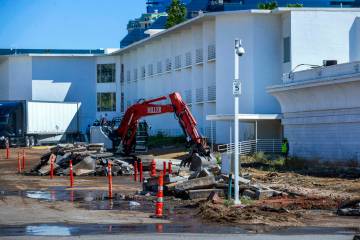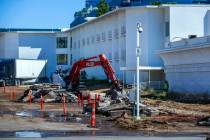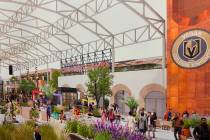Q&A with Steve Stallworth, general manager of South Point Arena and Equestrian Center
Many Las Vegas arenas are known for specialty programming — and few have dominated a niche as well as the South Point Equestrian Center.
Overseeing the horse center known for its equestrian events, including championship level, is one of Las Vegas’ most knowledgeable sports venue managers — 21-year arena veteran Steve Stallworth.
Stallworth, a former University of Nevada, Las Vegas quarterback in the 1980s, has an impressive local sports venue resume, which includes serving as the Orleans Arena vice president and general manager; associate director of the Thomas & Mack Center, Sam Boyd Stadium and Cox Pavil ion; and UNLV Athletic Department’s sports marketing director.
With dozens of venues in Las Vegas, Stallworth said it’s difficult for an arena to provide acts for every demographic. He suggested venues should evaluate their strong suit, then map a game plan to tap the market.
South Point’s 4,500-seat facility hosts an astonishing 31 weeks of equestrian events, including both breed shows and performance horse shows. There are also 1,200 horse stalls and more than 30 wash racks.
“As a venue manager, a lot of times we try to be all things to all people, but I think it’s important to understand your venue’s strengths and how it fits in the marketplace,” said Stallworth, 48, a married father of two.
“For the South Point, it’s pretty simple. Although our Arena and Equestrian Center is a flexible, multi purpose venue, we were designed and built for the equestrian industry. And although we may host other types of events, we go to bed every night and wake up every morning focused on our bread-and-butter industry,” he said.
Although arenas should know their identity in the competitive Las Vegas market, arena managers juggle a kaleidoscope of tasks.
“Arena managers are the ultimate multi taskers and can typically feel like that guy who is spinning multiple plates and trying to make sure none of them fall,” Stallworth said.
What was the business strategy behind South Point carving out a niche for equestrian events at your arena?
The South Point Equestrian Center was conceived and created by Paula and Michael Gaughan in probably the most perfect way possible. They were able to combine their love and passion for horses and the equestrian industry with one of the most exciting tourist destinations in the world. What they came up with was an expertly designed equestrian facility with first-class amenities associated with a four-star hotel, casino, spa and resort that is really unmatched anywhere in the world. Because of this combination, we have been able to attract every equestrian event in the country that we have wanted. And because we’re in Las Vegas, most of these events are the championship-level events of their respective classes. Our events can range from a three-day show to a 14-day show. Each horse brings an average of 3.5 people and the average stay is four days. It’s a great business model for Las Vegas success.
What was the most impressive horse or type of horse you’ve seen at an event?
All horses are impressive and unique in their own right. Many think of the National Finals Rodeo when they think of the equestrian industry associated with Las Vegas, but we host everything from breed shows to performance horse shows. Our Arabian horse show is the most prestigious Arabian show in the world and our World Series of Team Roping event is the third highest-paying equestrian event in the world.
What’s your take on the race to build the next arena in Las Vegas?
Our city never ceases to amaze me in what we will do to take care of our guests. Frankly, I didn’t know there was a “race,” but if there was I think we should be mentioned in the conversation when it comes to venue development. Michael Gaughan has built two arenas (the Orleans and South Point) in Las Vegas and we just broke ground on a $30 million facility that will include a 100,000-square-foot championship bowling center, as well as two additional equestrian venues. Our new venues should be completed by July of 2014.
What are the most important attributes for an arena manager these days?
In the old days, an arena manager would throw the keys to a promoter and tell them to lock the doors when they were finished with their event. Not so anymore. The requirements for today’s arena manager are very demanding and complex. There are many stakeholders an arena manager must manage: promoters, artists, agents, managers, owners, company management, media, employees, customers, participants, vendors, and in our case, horse owners, trainers, riders and of course, animals.
What’s the challenge like to compete with so many other arenas and venues?
Las Vegas’ residents and tourists have high entertainment and service standards, and they demand options for their entertainment dollar. I feel Las Vegas can sustain multiple venues, but only if they deliver on the customers’ expectations.




























